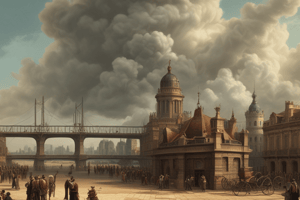Podcast
Questions and Answers
Which inventor's creations most directly enabled extended workdays and new forms of urban entertainment in the late 19th century?
Which inventor's creations most directly enabled extended workdays and new forms of urban entertainment in the late 19th century?
- Thomas Edison (correct)
- Andrew Carnegie
- Samuel Morse
- Samuel Gompers
Which action is most closely associated with the concept of 'laissez-faire' economics?
Which action is most closely associated with the concept of 'laissez-faire' economics?
- Government regulation of industry
- Minimal governmental intervention in the economy (correct)
- Government ownership of key industries
- Increased worker protection laws
Which of these factors most directly contributed to the rise of monopolies in industries such as oil during the late 19th century?
Which of these factors most directly contributed to the rise of monopolies in industries such as oil during the late 19th century?
- The implementation of a graduated income tax
- Consolidation of businesses and control over key resources (correct)
- Strong labor unions preventing single-company dominance
- Government enforcement of antitrust laws promoting competition
Which supreme court case validated the constitutionality of racial segregation under the 'separate but equal' doctrine?
Which supreme court case validated the constitutionality of racial segregation under the 'separate but equal' doctrine?
Which goal was shared by both the Knights of Labor and the American Railway Union?
Which goal was shared by both the Knights of Labor and the American Railway Union?
Flashcards
Monopoly
Monopoly
Exclusive control by one company over a market or industry.
Laissez-faire
Laissez-faire
A policy allowing businesses to operate with minimal government interference.
Bessemer Process
Bessemer Process
Process for mass-producing steel efficiently and cheaply.
Jim Crow Laws
Jim Crow Laws
Signup and view all the flashcards
Populism
Populism
Signup and view all the flashcards
Study Notes
- Dynamo: An electrical generator that produces direct current.
- Trust: A business arrangement where stockholders in several companies transfer their shares to a single set of trustees.
- Monopoly: Exclusive control by one company or group over the production or sale of a particular product or service.
- Laissez-faire: An economic system in which transactions between private parties are free from government intervention such as regulation, privileges, tariffs, and subsidies.
- Bessemer: A steel-making process; blowing air through molten pig iron to burn out excess carbon
- Samuel Morse: Inventor of the telegraph and Morse code, revolutionizing long-distance communication.
- Thomas Edison: Inventor of numerous devices such as the light bulb, phonograph, and motion picture camera.
- John D. Rockefeller: Founder of Standard Oil, dominating the oil industry through monopolistic practices.
- Chicanery: The use of trickery to achieve a political, financial, or legal purpose.
- Proletarian: A term for the working class, especially in a capitalist society.
- Strike of 1877: A nationwide railroad strike in response to wage cuts; federal troops were used to suppress it.
- Arbitrate: To settle a dispute by using an independent third party.
- Clemency: Forbearance; leniency.
- Molly Maguires: A secret organization of Irish miners in Pennsylvania, known for violent resistance against mine owners.
- Andrew Carnegie: Industrialist who led the expansion of the American steel industry.
- Samuel Gompers: Founder of the American Federation of Labor (AFL), advocating for workers' rights.
- Pope Leo XIII: He attempted to define the position of the Church on social questions arising from the Industrial Revolution.
- John Wood: Governor of Illinois.
- Jacob Coxey: Led a march on Washington D.C. to advocate for government jobs for the unemployed.
- Mother Jones: Labor organizer who fought for the rights of miners and child laborers.
- William Jennings Bryan: Populist politician and orator, advocating for reforms such as bimetallism and regulation of railroads.
- William McKinley: U.S. President who supported business interests and expansionist policies.
- Jim Crow Laws: State and local laws that enforced racial segregation in the Southern United States.
- Plessy v. Ferguson: Supreme Court decision that upheld the constitutionality of racial segregation under the "separate but equal" doctrine.
- Populism: A political movement that sought to represent the interests of ordinary people against the established elite.
- Graduated Income Tax: A tax system where higher incomes are taxed at a higher percentage rate.
- Knights of Labor: An inclusive labor organization that advocated for a wide range of reforms.
- American Railway Union: An industrial union that represented railway workers.
- General Managers Association: An organization of railroad executives that coordinated policies to suppress unions and strikes.
Studying That Suits You
Use AI to generate personalized quizzes and flashcards to suit your learning preferences.





